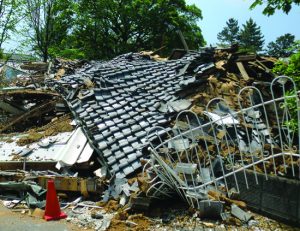×


We have detected your country as:
Please click here to go to the USA website or select another country from the dropdown list.
by: Ilse Posselt, Bridges for Peace

(Ryolee2/wikipedia.org)
Once again, Israelis were the first on the ground, bringing much-needed relief in response to two devastating earthquakes that shook Japan’s Kumamoto province in April of this year. Nearly 50 people were killed and thousands injured by the powerful quakes. The tremors resulted in dangerous landslides and caused large-scale damage to roads, bridges and other infrastructure. According to Japanese media, some 180,000 people were housed in temporary shelters, 62,000 homes were without electricity and up to 300,000 houses had no access to water.
Atsumi Takada, national director of the Bridges for Peace Japan office, reported that aftershocks were constant for a prolonged period of time after the initial earthquakes. There are 485 churches in Japan that host monthly Chai Prayer nights, time set apart to pray for the nation of Israel. Four of these church buildings were destroyed. The remaining Chai Night groups joined together as one to pray and reach out to those who have lost everything.
For its part, the Israeli delegation, represented by the organization IsraAID, distributed crucial supplies and opened child care centers in the disaster-stricken regions of southern Japan. In fact, as reported by Israel21c, the Israeli delegation had not left the area for five years, but was still helping with the recovery from a devastating tsunami which hit the island in March 2011. IsraAID was the only international aid organization with volunteers and workers on the ground and so was able to reach the most affected areas in a matter of days.
Despite constant attacks and criticism from across the globe, Israel is often the first to rush to the aid of those in need. The tiny nation’s commitment to offer a helping hand is a long-standing one. Within a decade of the birth of the modern State of Israel, the government and its people demonstrated a deep dedication to international relief efforts. “Over the years, the country has extended international humanitarian aid assistance to more than 140 countries, even to those who do not maintain diplomatic relations with the Jewish state,” says Israel’s Ministry of Foreign Affairs.
Perhaps tiny Israel’s willingness to help stems from the concept of tikun olam or repairing the world. Tikun olam is expressed as the obligation or responsibility of every Jewish person to work towards a better world for all of mankind.
Maybe that is why dedicated Israelis will continue to go to the four corners of the earth to provide help in time of need. In visible and practical ways, they are demonstrating the Lord’s commandment that “you shall love your neighbor as yourself” (Lev. 19:18).
All logos and trademarks in this site are property of their respective owner. All other materials are property of Bridges for Peace. Copyright © 2025.
Website Site Design by J-Town Internet Services Ltd. - Based in Jerusalem and Serving the World.